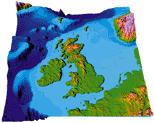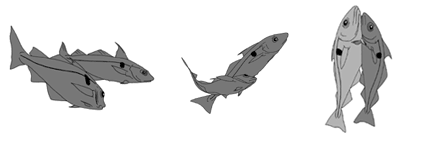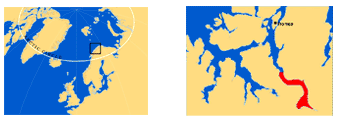|
Searching for Spawning Fish
At the FRS Marine Laboratory in Aberdeen, Scotland, Tony Hawkins
has been listening to the sounds made by marine fish, both in the aquarium
and at sea
 Scotland
lies in the eastern part of the North Atlantic, almost completely surrounded
by cold but very productive seas. But the fisheries are under threat.
Both cod and haddock have been fished beyond safe biological limits.
The numbers of adult spawning fish are low and few young fish are surviving
each year to enter the fishery. Scotland
lies in the eastern part of the North Atlantic, almost completely surrounded
by cold but very productive seas. But the fisheries are under threat.
Both cod and haddock have been fished beyond safe biological limits.
The numbers of adult spawning fish are low and few young fish are surviving
each year to enter the fishery.
Spawning areas can be closed to fishing, but where do cod and haddock
spawn? Catches of mature fish can be mapped, and the drifting eggs and
larvae found but these do not tell us where the spawning grounds are,
or what they are like.
Though haddock live in quite deep water, deeper they spawn in the aquarium
at the FRS Marine Laboratory. The male haddock occupy territories on
the bottom, moving in tight circles and making continuous sounds.
 |
The repeated knocks sound
like a motorbike idling. They seem to drive away competing males,
but attract ripe females. |
When the female enters the territory of the male, an elaborate courtship
begins. The male speeds up his knocking sounds, like a motorbike revving
up, and dances around the female.
This behaviour eventually culminates in a spawning embrace, where the
eggs and milt are shed into the water.

The sounds are easily recognised. By listening from a
research ship spawning haddock may be found at sea. One concentration
has been found at Balsfjord in northern Norway. Here, the voices of
many haddock combine at night to give a deep rumbling sound.

Further surveys may map the spawning grounds of haddock
across the North Atlantic, and seek out the spawning grounds of other
noisy fish, like the cod.
Fishing on spawning grounds is likely to disrupt fish behaviour and
reduce spawning success. Closure of these areas to fishing may help
conserve fish stocks, and will be the subject of future research. Tony
Hawkins, Department of Land Economy, University of Aberdeen, Scotland,
UK: a.hawkins@abdn.ac.uk or greenseas@btopenworld.com
Return to Top | Research
Programs
|
 Scotland
lies in the eastern part of the North Atlantic, almost completely surrounded
by cold but very productive seas. But the fisheries are under threat.
Both cod and haddock have been fished beyond safe biological limits.
The numbers of adult spawning fish are low and few young fish are surviving
each year to enter the fishery.
Scotland
lies in the eastern part of the North Atlantic, almost completely surrounded
by cold but very productive seas. But the fisheries are under threat.
Both cod and haddock have been fished beyond safe biological limits.
The numbers of adult spawning fish are low and few young fish are surviving
each year to enter the fishery.

